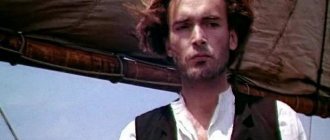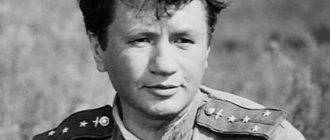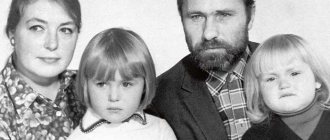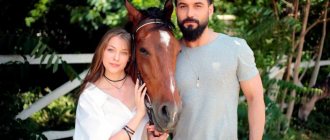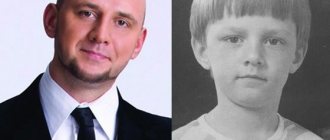BIOGRAPHY
Andrei Konchalovsky is a representative of the Mikhalkov-Konchalovsky creative dynasty. His mother Natalya Petrovna Konchalovskaya is a famous poet and translator, the daughter of the artist Pyotr Konchalovsky and the granddaughter of the famous painter Vasily Surikov. Father - writer Sergei Vladimirovich Mikhalkov. The concept of clan and continuity of generations has always occupied a special place in this family. Konchalovsky himself gives a very precise definition: “There is a Mikhalkov-Konchalovsky clan. But the clan does not mean that we all act together against the rest of the world. It’s just that if someone feels bad, we will look for support in the family, and not go to the side.”
The future director spent his childhood on the Mikhalkov family “estate” on Nikolina Gora. “I was not a spoiled child, as children of elite parents often are. Of course, there were rations and various benefits due to my father’s rank,” recalls Andrei. At the age of 7, his parents sent the boy to the Central Music School. Andrey’s mother instilled a love for music in him - she dreamed that there would be musicians in her family, and that in the house they would always play the piano and learn scales. She still had fresh memories of the time when, as a young high school student, she sat with her friends on the stairs in front of Rachmaninov’s apartment and listened to him learn his works.
They forced me to study music every day, and gradually Andrei began to get involved. The environment also had a great influence: Prokofiev, Richter, and many others came to visit. In 1957, Konchalovsky entered the Moscow Conservatory and studied piano. But he soon realized that music was not exactly what he wanted to do. “At the conservatory, I was burdened by the desire to be no worse than others, but I understood that this was not so. We studied with a wonderful teacher and brilliant musician Lev Oborin, there was Volodya Ashkenazi, Mitya Sakharov, Voskresensky, Naum Shtarkman. Such a meeting that it was easy to be worse than them. But this depressed me very subconsciously. Or rather, this: being in the cinema hall, I experienced much more energy - it seemed to me that I could do better,” recalls Andrey.
Star Daughters
Anna Zavorotnyuk
By the age of eighteen, the daughter of the famous actress Anastasia Zavorotnyuk had already achieved serious success in the modeling business: the girl’s face appears with enviable regularity on the pages of fashionable youth magazines. Anya spent her childhood in Los Angeles, where her father owned a small real estate agency. The pretty blonde spent her youth in England, graduating from a prestigious school there. Well, the girl decided to spend her best years in Moscow. Anna does not deny herself social gatherings and expensive outfits - she can often be found wearing them in the best Moscow clubs. Now the daughter of the “beautiful nanny” is studying at the sociology department of Moscow State University, but more than VTsIOM polls, she is worried about the podium and photo flashes, so she checks into the first humanities building on Vorobyovy Gory extremely rarely.
Anastasia Shubskaya
A hair-eyed brunette with a model appearance was born on November 16, 1993 in Switzerland, becoming the youngest daughter of Vera Glagoleva and shipbuilder Kirill Shubsky. The 20-year-old student followed in her mother’s footsteps and is in full swing building a career as an actress, having managed to play cameo roles in several films between lectures at VGIK. Despite her busy schedule, she also does not deny herself going out. The star daughter gave her heart to Artem Bolshakov, a student from New York.
Stefania Malikova
Stesha, as her relatives call her, was born on February 13, 2000. This angelic blonde is the only daughter of Dmitry Malikov. Despite her young age, the girl is trying hard to break into show business. She not only plays the piano and guitar during home gatherings, but also demonstrates her talent on stage in a duet with her father. In addition, the microblogs of 13-year-old Stesha are very popular among her peers and others, which has already become a real headache for her parents - they are afraid of the evil eye.
Eva Kanchelskis
The 14-year-old daughter of Inna Mikhailova and the stepdaughter of the famous artist Stas Mikhailov, despite having many brothers and sisters, remains a favorite in the family. The young lady already attends social events with all her might and actively maintains microblogs in which she shares photographs from Bosco shows and vacations in the Maldives. Now the schoolgirl is nibbling on the granite of science in a prestigious school in England, where her generous stepfather sent her.
Lena Konchalovskaya
The 20-year-old daughter of director Andrei Konchalovsky does not advertise her affiliation with the star dynasty. The girl prefers to spend time in the company of middle-aged hipsters over a glass or two in the Simachev or Strelka bars. There she can be seen at any time of the day, often in an embrace with photographer Alexei Kiselev. But, unlike her big name, the girl does not hide her bad habits: a cigarette and a bottle are constant attributes of her photo shoots. If Lena whiles away her nights in lush places, then she spends her days at the theater studies department of GITIS. Her dream is to build an acting career.
FIRST WORK
Konchalovsky left the Conservatory and in 1959 entered VGIK, in the workshop of M.I. Romma. There he meets Andrei Tarkovsky, who was graduating from college at that moment. “I met him at VGIK in the editing room. By the way, we then went into the editing room with a razor and acetone and glued the frames together. When scotch tape appeared, it was a breakthrough. And then one day I was walking down the corridor, and I heard Glen Miller’s music playing, and I was very interested in him back then. The door was ajar, I looked in - there was someone sitting there with a palm tree on his head, he had such long hair, and he was editing something,” the director recalls.
Konchalovsky helps Tarkovsky in writing the script for his graduation work, “The Rink and the Violin” (1960), a film largely influenced by the French film “The Red Ball” (1956) directed by Albert Lamorisse. The motives of this film can also be traced in the work of Konchalovsky himself - the short film “The Boy and the Dove” (1961). According to cameraman Vadim Yusov, who worked with Tarkovsky, one could already discern the talent of director Konchalovsky in this film. The film fit very neatly into the Thaw trend and won the Bronze Lion of St. Mark in the children's film competition at the Venice Film Festival.
"Ivan's childhood"
In 1962, Andrei Tarkovsky shot “Ivan’s Childhood” - a film after which people started talking about him as a great director. Konchalovsky advised taking on the main role of Kolya Burlyaev, a young man who played the main role in his debut film “The Boy and the Dove.” Tarkovsky recruited Konchalovsky to write the script, and after just two and a half weeks the work was completed. In the film, Konchalovsky also acted as an actor, playing the cameo role of a soldier.
The film "Ivan's Childhood" was a phenomenal success. The film was highly appreciated by major cultural figures: Bergman, Kieslowski, Sartre, and many others. And at the Venice Film Festival the film was awarded the highest award - the Golden Lion.
"Andrey Rublev"
Tarkovsky's next work was the historical drama Andrei Rublev (1966), in which Konchalovsky again co-wrote the script. The work required careful preparation; studying the material alone took six months. To understand what life was like at that time, one had to read books on the history, life, and crafts of Ancient Rus'. Andrei Konchalovsky recalls about his work: “The script for Andrei Rublev may have been talented, exuberant, filled with flights of imagination, but it was unprofessional. He did not fit into any parameters of dramatic form. It contained two hundred and fifty pages, which, with a normal recording taken for filming, would have turned into a good four hundred. When Andrey started filming, the footage spread like dough from a kneader. It was necessary to cut, and we began to chop up the script mercilessly: the plague scene and much more flew out of it entirely.”
In the USSR, the film was banned for some time, but this did not stop it from being shown outside the competition program at the 1969 Cannes Film Festival. There the film was a huge success and was awarded the FIPRESCI IFF prize.
Lena Konchalovskaya - about whether to take the first step
In the summer, just before my first year, I fell in love. The first, big, real one. As it should be, when you are seventeen, it smells like hot asphalt, the whole summer is ahead, you are young and carefree. You walk, toil all day, warm your bare knees in the sun and just wait for a meeting. But you only know one thing for sure: “I want to be with you.” That is, no, not like that, more like: “I want to be with you, but I’m afraid.” The boy was handsome, gray-eyed, and also an artist. We walked a lot, ran away from theaters in the middle of the first act, of course, corresponded on VKontakte for days on end... But he was in no hurry to explain himself and in general, he was terribly embarrassed by me. Since I was not known for patience, especially at seventeen years old, I kissed him first. As I remember now: we had just said goodbye, I watched him go down the steps into the passage, I counted “one, two, three” and ran after him, grabbed his hand and quickly kissed him. Because it's now or never!
And this is always the case for me. If you think about it, I generally always do everything first. All my best relationships (that is, any relationship in principle) began with my input. It happened, of course, that they courted me, gave me flowers, stood for hours at my windows... In a word, they did everything that is called “winning love.” Who came up with this nonsense, by the way? Love cannot be won, much less deserved, at least the kind of love that makes your knees shake. In general, in such cases, even if I surrendered to the conquerors and fell a little in love in return, everything went to hell, if not immediately, then almost immediately.
There is a stereotype that women don't know what they want. But this is not so: if a person “doesn’t know” or “doubts”, then this is most likely due to idleness - how can you not know if it’s tickling under your ribs, if your breathing is shortened, if you’re pronouncing someone’s name with excitement? ? In general, if a girl says: “I don’t know” - (and we really say this all the time) - then, most likely, her desire to introduce a little drama into her life speaks for her. And usually, according to the rules of the genre, this does not end well.
- Psychology: 3 types of men you definitely need to break up with
- Psychology
Ekaterina Volgina: “Some episodes of Black Mirror no longer seem so fantastic”
In general, when you are the first to take this - terrible name - first step, you know for sure that this is what you want. That you need it. And it’s so wonderful to know what you need. Remember how Tsvetaeva did? “...I always kiss first, as simply as shaking hands, only more uncontrollably. I just can't wait! Then, every time: “Well, who pulled you? You are the one to blame!". I know that no one likes this, that they all like to bow, beg, look for an opportunity, achieve, hunt... And most importantly, I can’t stand it when someone else kisses me first. So at least I know I want it.”
Therefore, being afraid to approach, say and do anything first is somehow stupid. But to take it and stop playing and flirting, come with your soul inside out, take it and do something real - it’s so great. And in general, there is nothing more beautiful than this feeling: “I’ll now step over myself and tell everything as it is.” There is some impossibly beautiful power in this, and it is definitely worth feeling. And no one has ever broken down from refusal. Well, they’ll tell you “no,” so what? Well, he doesn’t like you, so what now? But Seryozha or Nikita like them. And in general, “no” may hurt, but then it’s immediately easy. No more guessing and suffering - now it’s clear, now I know. Now we can move forward. I remember very well how on Nevsky Prospekt, in a terrible hailstorm, in some stupid telephone booth with a red machine they told me very clearly and loudly: “No.” And I turned around and left. I walked and thought: “It’s so good, now it’s all over. It’s so good it’s all over.” In the end, every disappointment is a discovery. And in general, it’s better to go and do it than later, years later, bite your elbows and think: maybe it was necessary after all?
“Considering anyone you like is obviously an asshole and a sadist, folding your arms across your chest, making sarcastic remarks, smirking, saying “convince me” - or one day giving in and saying “listen, I’m terrified of how much power you have over me, you’re amazing, I’m very scared, let’s talk”?” — wrote Vera Polozkova, and I must say, I think so too. Let's talk?
Lena Konchalovskaya, editor of Buro 24/7
DID YOU LIKE THE ARTICLE? Subscribe to Grazia's best content newsletter
Thank you!
We have sent a confirmation email to your email.
DIRECTOR
In the early 60s, Andrei Konchalovsky, in collaboration with Gennady Shpalikov, wrote the script for his debut feature film entitled “Happiness”. The director’s idea was extremely interesting: “Music has always given me an active desire to make films. I wanted to attach visible images to it, to find in the frames adequacy with the sound range. “Happiness” I wanted to start right away with an emotional climax, like in Tchaikovsky’s First Concerto. And the whole scenario had to consist of moments of a happy, emotional, exalted state. It turned out to be quite interesting, although it did not have a strong dramatic connection and broke up into separate episodes, separate short stories. The only thing that ran through the script was its sensual line.”
As a result, the film did not take place. Konchalovsky received a new interesting offer - Boris Dobrodeev brought a script based on the novel “The First Teacher” by Chingiz Ai.
The film “The First Teacher” was released in 1965 and became the first full-length film by the young director. At the 1966 Venice Film Festival, the film was awarded the Osella Silver Medal, and the leading actress, Natalya Arinbasarova, received the Volpi Cup for Best Actress.
In 1967, Konchalovsky made the film “The Story of Asya Klyachina, who loved but did not marry.” The film was shot in a real village with non-professional actors. In the film, the director showed undisguised Soviet reality - realities that were usually kept silent in the art of socialist realism. The then KGB chairman Semichastny said: “Only a CIA agent could have made Asya Klyachina.” The picture went on the shelf, and its premiere took place only 20 years later.
Andrei Konchalovsky works hard and fruitfully. He makes the films “The Noble Nest”, “Uncle Vanya”, “Romance of Lovers”, “Siberiada”. He stars both beginning actors and masters of Soviet cinema: Innokenty Smoktunovsky, Sergei Bondarchuk, Lyudmila Gurchenko, and many others. Konchalovsky is a renowned director; his films are shown at major international film festivals and awarded with all kinds of awards. But he decides to leave the USSR.
WORK IN THE USA
In 1980, the director left for the West and worked in Hollywood. He makes commercials and shoots the short film “Broken Cherry Tree.” The opportunity to direct a full-length film appeared when Konchalovsky met Israeli producers Menahem Golan and Yoram Globus. The director makes the films “Mary’s Beloved,” “Runaway Train,” “Duet for the Soloist,” “Bashful People,” “Homer and Eddie.” The last film of this period was Tango and Cash, a blockbuster starring Sylvester Stallone and Kurt Russell. However, doubting the success of the film, the producers removed Konchalovsky from the work, and another director finished filming it. Later, Andrei admitted that it was even better: “It seems to me that I was not flexible enough to make commercial films. If I had become successful, I would not have made the films that are dear to me.”
In the early 90s, the director returned to Russia. An important work of this period is the painting “Ryaba Hen,” which tells the story of the fate of Asya Klyachina in post-communist Russia. In 1997, Konchalovsky returned to the USA and filmed the mini-series “Odyssey”. The film was nominated for Best Director and received a Golden Globe nomination.
LATER CREATIVITY
In the 2000s, Konchalovsky worked a lot and fruitfully. He has released films “The House of Fools”, “The Lion in Winter”, “Gloss”, “The Nutcracker and the Rat King”. The director's wife and muse, actress Yulia Vysotskaya, plays in these films.
One of the most striking recent works is the film “White Nights of Postman Alexei Tryapitsyn” (2014). Filming took place in a village in Arkhangelsk province. The roles, as in “Asa Klyachina,” were performed by non-professional actors. “Postman Alexey Tryapitsyn is a real figure, he lives in a real place, delivers bread, letters, taxes, light bulbs, money, pensions to local residents - in general, this postman is life for them. This film is my feelings about life among very simple Russian people. I made a movie about them, filmed it with them, they helped me write the script,” says the director.
The film “White Nights of the Postman Alexei Tryapitsyn” was awarded many awards and prizes, including the “Silver Lion” at the Venice Film Festival and the “Golden Eagle” for best screenplay.
The director’s new project is the film “Paradise,” which tells about the fate of three young people during the Second World War. For this film, Andrei Konchalovsky was awarded the Silver Lion for directing at the Venice Film Festival in 2020.
Hollywood period
In collaboration with American colleagues, Andrei Konchalovsky shot the dramatic film “Broken Cherry Tree.” This work was included in the short list for the legendary Oscar in 1983. The first work was the film “Mary's Beloved,” where Nastassja Kinski played the main role.
A famous Hollywood film directed by Konchalovsky is “Runaway Train.” One of the key roles here was played by Angelina Jolie's father Jon Voight. For his films, shot together with American partners, the domestic filmmaker received many awards.
The most impressive film was the action-comedy with Sylvester Stallone “Tango and Cash.”
Andrei Konchalovsky chose to return to his homeland in the early 90s. Then the paintings were born: “Ryaba Hen”, “House of Fools”, “Gloss”, “Lion in Winter”.
TV PROJECTS
Television projects occupy a special place in the director’s work. In 2005, Konchalovsky worked on the series “Culture is Destiny.” The goal of the project is to consider the main topics and concepts in human life: work, tolerance, money, civilization, and others. In each episode, the author expresses his point of view on a certain aspect of life and suggests discussing the topic with cultural figures and scientists.
The television series “Genius,” dedicated to the life and work of great Russian composers, is another project of Konchalovsky. Each episode is dedicated to one hero: Prokofiev, Rachmaninov, Stravinsky, Scriabin, Shostakovich, Sofronitsky. The goal of the project is to draw parallels between the artist’s life and his work.
Andrei Konchalovsky is the author of the project “Burden of Power,” which tells about politicians and the role they played in the fate of their country. The cycle began with a film about Yuri Andropov. The next part came out a year later and was dedicated to Heydar Aliyev. The director said: “There are many examples in history when, having acquired absolute power, rulers used it for evil. But a wise politician is able to use it for good... Aliyev spent 14 years as the first secretary of the Communist Party of Azerbaijan, starting with the fight against corruption, with the republic’s exit from the economic impasse. He was a national hero. He was kicked out, but after that he once again became the head of the country. None of the politicians in the Soviet Union managed to be kicked out, then return, become the head and honor of the nation.”
The final part of the project was released in 2012. It is dedicated to the personality of Leonid Kuchma and the question of the position of Ukraine in the modern world. In the film, the director attempts to explore the mechanisms of the relationship between East and West and consider the phenomenon of confrontation between powerful powers using the example of a single state - Ukraine.
THEATER
Andrei Konchalovsky is an internationally recognized theater director. He has produced many dramatic and opera productions. At the famous La Scala he staged the operas Eugene Onegin and The Queen of Spades, at the Mariinsky Theater - War and Peace, and at the Teatro Reggio in Parma - Verdi's opera Un ballo in maschera. “Critics sometimes write that in my productions it is clear that the film director staged them. It's funny for me to read this. I am a theater director when I stage in the theater. I am an opera director when I stage an opera. And I am a film director when I direct a film. But I never allow myself to mix one with the other,” says the director.
Comparing theater and cinema, Konchalovsky admits: “Theater is much more interesting to me than cinema. Because in the theater you have the opportunity to work with geniuses: Shakespeare, Ibsen, Strindberg, Chekhov, Ionesco. The great ones do not become obsolete, because through them there is always the opportunity to reveal feelings.”
The director considers A.P. to be an important writer. Chekhov. His first turn to the author on stage occurred in 1987, when Konchalovsky staged “The Seagull” at the Odeon Theater in Paris with Juliette Binoche in the role of Nina Zarechnaya. And in Russia, already on the stage of the Mossovet Theater, the director staged all the main plays of the playwright: “The Seagull” (2004), “Uncle Vanya” (2009), “Three Sisters” (2012), “The Cherry Orchard” (2016). Analyzing the work of great writers, the director comes to the conclusion: “Chekhov is perhaps the most important Russian playwright. He is eternal because he has no answers, only questions. And in great drama there is always a mystery. Actually, they are still trying to solve this mystery, but this cannot be done, just as it is impossible to answer the question of what life is.”
In March 2020, the premiere of the rock opera “Crime and Punishment” took place, directed by Andrei Konchalovsky. This production is the result of long and painstaking work by the creators of the play, which lasted about 35 years.
PERSONAL LIFE
Andrei Konchalovsky was married 5 times. The director's first wife is ballerina Irina Kandat. The relationship lasted about three years.
The second wife is actress Natalya Arinbasarova. Their romance began during the filming of the film “The First Teacher,” in which Arinbasarova played the main role. In 1966, the couple had a son, Yegor. Four years later they separated.
Konchalovsky's third wife is Frenchwoman Vivian Gaudet; they got married in 1969. The marriage produced a daughter, Alexandra.
In the late 70s, Andrei had a short affair with actress Irina Brazgovka. They had a daughter, Daria (1980).
The master's next wife was television announcer Irina Martynova. The marriage produced daughters Natalya (1991) and Elena (1993). The marriage lasted seven years.
The director's fifth wife was actress Yulia Vysotskaya. The couple has two children - Maria (1999) and Peter (2003). As Andrei admits, meeting Yulia largely changed his attitude towards such things as marriage and family. “If I were now as old as Yulia, we would hardly have lived together for 14 years! I would have run away somewhere a long time ago. Or she would have left me because I would have behaved differently! And I think I was wildly lucky that I met the woman of my life when I already understood what she meant…” admits Konchalovsky.
Wives and children
The second wife, who became the mother of his first son Yegor (b. 1966), Natalya Arinbasarova, starred in his graduation film. A serious conflict occurred with the family of the Kazakh ballerina, in which the head of the republic D. Kunaev personally intervened. In 1966 they had a noisy wedding.
This marriage lasted 4 years, after which for 11 years the director was officially married to a Frenchwoman, Vivian Gaudet, who lived in Moscow in the family of a French banker. In 1969, the wife gave birth to a daughter, Alexandra. The young woman now lives in Paris and has four children.
In 1987, Andron Konchalovsky met Irina Martynova, a TV announcer, at a film festival. The woman’s biography is known throughout the country today. From a seven-year marriage, two daughters were born: Natalya (who graduated from a French school with honors and is receiving education abroad) and Elena, a student at GITIS.
In 1996, at a festival in Sochi, Konchalovsky met with the Belarusian actress Yulia Vysotskaya, whose age difference was 36 years. The director is truly happy in his marriage to her; for the first time, the director declared the priority of family over career issues in his life. The couple has two children: daughter Masha and son Peter.
In 1997, the director learned about the existence of an illegitimate daughter, Daria, born in 1980, from actress Irina Brazgovka. Daria gave him three grandchildren. For seven children, the best father is Konchalovsky.
INTERESTING FACTS
- Living in America, Konchalovsky made money for almost three years by selling caviar in Hollywood
- It was initially assumed that the film “White Sun of the Desert” would be directed by Andrei Konchalovsky
- Konchalovsky has dual citizenship - Russian and French
- Andrei’s favorite film from Nikita Mikhalkov is “Five Evenings”
- The director was influenced by Bergman, Kurosawa, Fellini, and Buñuel
- According to Konchalovsky, the greatest book about World War II is Jonathan Lytell's novel "Benefactors"
IN LIFE
Andrei Konchalovsky is a supporter of a healthy lifestyle. The director always moved a lot, went for a daily morning jog, and rode a bicycle. In one of his interviews, he admitted: “It is important for any person to maintain energy for as long as possible. I started taking my health seriously at 30 years old. Every year I arranged fasting days for myself - I went hungry for 16 days. Now I start my morning by drinking three glasses of fresh juice: from beets, from carrots and from oranges - singer Bryan Adams taught me this. And after the juices - another liter of water. The body receives a colossal blow of energy - like a shower, only internally.”
The director admits that he learns something new all the time. Konchalovsky continues to improve his knowledge of Italian and English, plays tennis, and at the age of 64 he started skiing for the first time.
INTERVIEW
About the actors
“In principle, a great actor does not have to be smart - that’s the director’s share. But you won’t build your character on intuition alone. You need to answer a lot of questions: what is your character like in bed, his zodiac sign, parents, favorite food - all this brings you closer to understanding the person you play. It’s important to come up with it completely. An actor is like a hunting dog that senses and brings game, and the hunter is a director. In this painful search, the director must give the actors the opportunity to make mistakes, to go in the wrong direction.”
About art
“There are many worlds. Once you make a selection, it’s already an art.”
About culture
“Culture is not knowledge of works of art. Culture is knowing your responsibilities. And the duties must be indoctrinated by the state.”
About power
“Still, there is truth that a man in power is sexually attractive. Power is the key to success for women.”
About jealousy
“Artists who grow together and feel each other’s scale are very wary of each other. There is often some kind of almost childish jealousy in this. There is a feeling of slight satisfaction when your opponent’s picture doesn’t work out! We put on a serious face and show our worries. There really is no joy in this, but it’s still slightly pleasant. What is this? Why? It’s true, there’s something childish about it.”
About brother
“We are both thinking people, but I am a philosophical person, and Nikita Sergeevich is an artist. I like to doubt, but he likes to believe. He is a very religious person. For me, faith must be tested by algebra.”
Based on materials from the television programs “White Studio” and “Monologue in 4 parts. Andrey Konchalovsky", websites konchalovsky.ru, snob.ru, proficinema.ru, 7days.ru, rosbalt.ru, esquire.ru, medved-magazine.ru, vladnews.ru, re-movie.ru, fakty.ua, 1001material .ru, zbulvar.ru, mk.ru, gazeta.ru
TITLES AND AWARDS
- "Bronze Lion of St. Mark" in the competition for children's films at the Venice Film Festival for the film "The Boy and the Dove" (1962)
- “Silver Shell” at the festival in San Sebastian for the film “Uncle Vanya” (1971)
- Laureate of the State Prize of the Kazakh SSR for the script of the film “The End of the Ataman” (1972)
- Grand Prix at the Karlovy Vary Film Festival for the film “The Romance of Lovers” (1974)
- Special Jury Prize at the Cannes Film Festival for the film “Sibiriyada” (1979)
- People's Artist of the RSFSR (1980)
- Emmy Award for Outstanding Directing for The Odyssey (1997)
- Prize "For Contribution to Cinema" at the Moscow International Film Festival (1997)
- Order of Merit for the Fatherland, IV degree (1997)
- Grand Prize of the Jury at the Venice Film Festival for the film “House of Fools” (2002)
- Academician of the National Academy of Motion Picture Arts and Sciences (2002)
- Officer of the French Order of Arts and Letters (2005)
- “Gold Star” “For contribution to the development of world cinema” at the Marrakech International Film Festival (2008)
- French Legion of Honor (2010)
- Golden Camera Prize for significant contribution to cinema at the Art Film Fest in Slovakia (2012)
- Winner of the second international prize named after Chingiz IFirst Teacher" (2012)
- Prize for outstanding contribution to the development of auteur cinema at the All-Russian festival of auteur short films "Artkino" (2013)
- “Silver Lion” for best director’s work at the Venice Film Festival for the film “White Nights of Postman Alexei Tryapitsyn” (2014)
- Golden Eagle Award in the Best Screenplay category for the film White Nights of Postman Alexei Tryapitsyn (2015)
- “Silver Lion” for Best Director at the Venice Film Festival for the film “Paradise” (2016)
- Golden Eagle Award in the category “Best Director’s Work” for the film “Paradise” (2016)
Start of a career in cinema
The end of VGIK’s directing direction in 1964 is marked for Andrei Sergeevich with the global cinematic work “The First Teacher” based on the work of Ch. Aitmatov. The film was presented in the form of a diploma and fully revealed the extraordinary abilities of the newly minted director. Later, “The First Teacher” was awarded several significant awards.
The next film is “The Story of Asya Klyachina, who loved but never married,” provocative for those times, the actors of which were ordinary residents of the region where the film was filmed. The film was banned and the general public saw the film only in 1988.
In 1969, the director turned his attention to the classics of Russian literature and released the works “The Noble Nest” and “Uncle Vanya,” which attracted the attention of foreign creators to Konchalovsky and brought him the “Silver Shell” award at the International Film Festival.
But Andrei Sergeevich gained universal fame and success after the release of the story “Romance of Lovers” in 1974. The film receives the Grand Prix of the festival held in Karlovy Vary. After which the director begins filming the four-part “Sibiriyada”, which in 1979 was awarded the Grand Prix at the Cannes Film Festival.
Filmography: Director
- Paradise (2016)
- White nights of postman Alexey Tryapitsyn (2014)
- Battle for Ukraine (2012), documentary
- The Nutcracker and the Rat King (2010)
- Everyone has their own movie (2007)
- Gloss (2007)
- Lion in Winter (2003)
- House of Fools (2002)
- Odyssey (1997)
- Lumiere and Company (1995)
- Chicken Ryaba (1994)
- Inner Circle (1991)
- Tango and Cash (1989)
- Homer and Eddie (1989)
- Shy People (1987)
- Duet for soloist (1986)
- Runaway Train (1985)
- Mary's Beloved (1984)
- Broken Cherry Tree (1982)
- Sibiriada (1979)
- Romance of Lovers (1974)
- Uncle Vanya (1970)
- Nobles' Nest (1969)
- The story of Asya Klyachina, who loved but did not marry (1966)
- First Teacher (1965)
- The Boy and the Dove (1961)
Film director's career
Konchalovsky's film debut as a director occurred back in 1961, when he was still a student. Interestingly, this film, called “The Boy and the Dove,” was immediately noticed by critics and even won the main prize at the debut competition of the Venice Film Festival for children and youth. But this was only the first figurine in the collection of the great director.
Konchalovsky made his second film in 1965. Its title is “The First Teacher” and, as Andrey himself admits, he was inspired to create the film by the work of Akira Kurasawa.
The very next year, Kochalovsky made a film under the ornate title “The Story of Asya Klyachina, who loved but did not marry.” What was interesting about this film was not only the title, but also the fact that only beginning artists were involved in its filming. Unfortunately, the censors categorically did not like the picture and therefore it was sent to the shelf.
It was only thanks to the persistence of Andrei Konchalovsky that “The Story of Asya Klyachina, Who Loved but Didn’t Get Married” finally saw the light of day, only it happened two decades later, namely in 1988.
Then the director turned to the classics and released the film “The Noble Nest” (1969) based on the novel by I.S. Turgenev. In 1970, “Uncle Vanya” was released to the audience, which a little later received the “Silver Shell” prize at the festival in San Sebastian.
After a short break, Konchalovsky filmed “The Romance of Lovers” (1974), which was incredibly warmly received by the public. The film also received the Grand Prix in Karlovy Vary.
Then Andrei spends four long years creating the magnificent mini-series “Sibiriyada”, which describes the story of two warring families. The film also vividly described almost 100 years of Russian life, which could not fail to impress critics. In 1979, “Siberiada” was even awarded a special jury prize at the Cannes Film Festival.
Andrei Kochalovsky’s collection of works includes the painting “The House of Fools” - winner of the Grand Prix of the Venice Film Festival in 2002.
In 2014, the director was awarded the Silver Lion at the Venice Film Festival for directing the film about the Russian outback “White Nights of Postman Alexei Tryapitsyn” and the Golden Eagle Award for best screenplay.
Two years later, Konchalovsky’s film “Paradise,” about the fate of three people during World War II, was also awarded the Silver Lion for directing at the Venice Film Festival.
The most recent work in the work of this talented director is the biographical drama “White Lilac,” which is scheduled for release in 2020. In total, Andrei Konchalovsky has twenty-nine films in his collection.
Andrei Konchalovsky is also known as a screenwriter. His debut in this field took place back in 1960. Then, in collaboration with the great classic of Russian cinema, Andrei Tarkovsky, he wrote the script for the film “The Rink and the Violin.”
Later, several more scripts would come from the pen of this duo, especially strong ones were created for the films “Ivan’s Childhood” and “Andrei Rublev.”
Filmography: Screenwriter
- Paradise (2016)
- White nights of postman Alexey Tryapitsyn (2014)
- Battle for Ukraine (2012), documentary
- The Nutcracker (2009)
- Demons of St. Petersburg (2008)
- Gloss (2007)
- Frost on the skin (2007)
- Everyone has their own movie (2007)
- House of Fools (2002)
- Odyssey (1997)
- Chicken Ryaba (1994)
- Inner Circle (1991)
- Shy People (1987)
- Duet for soloist (1986)
- Maria's Lovers (1984)
- Broken Cherry Tree (1982)
- Sibiriada (1979)
- Blood and Sweat (1978)
- Trans-Siberian Express (1977)
- Slave of Love (1976)
- Fierce (1974)
- The Seventh Bullet (1972)
- Waiting for you, boy (1972)
- Unexpected Joys (1972)
- The End of the Ataman (1970)
- Uncle Vanya (1970)
- Andrey Rublev (1969)
- Song of Manshuk (1969)
- Nobles' Nest (1969)
- Tashkent - the city of grain (1968)
- First Teacher (1965)
- Ivan's childhood (1962)
- Rink and Fiddle (1961)
